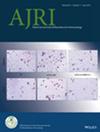New Immunological Indexes for the Effect of Systemic Inflammation on Oocyte and Embryo Development in Women With Unexplained Infertility: Systemic Immune Response Index and Pan-Immune-Inflammation Value
Abstract
Problem
Predicting the impact of systemic inflammation on oocyte and embryonic development in unexplained infertile women using the new immunological indexes.
Method of Study
This retrospective cohort study was conducted using the records of the In Vitro Fertilization Department of Ankara Gülhane Training and Research Hospital. After reviewing the records of patients who had undergone in vitro fertilization (IVF) for unexplained infertility (UI) and excluding all known factors that could cause systemic immune inflammation, the systemic immune response index (SIRI), and pan-immune score were calculated from the pre-treatment hemogram parameters between the embryo arrest (EA) group and the embryo transfer group. It was investigated whether there was a statistical difference between the two groups and whether an SIRI value affecting embryo quality was found. A receiver operating characteristic (ROC) curve analysis was performed to determine the optimal cut-off values for inflammatory markers to predict EA.
Results
The 108 EA group (embryos that were arrested during their development and could not be transferred) and the 140 embryo transfer group showed statistically significant differences in the parameters of systemic inflammatory index (SII), SIRI, pan-immune inflammation value (PIV), and neutrophil/lymphocyte ratio (NLR) (p < 0.05). These inflammatory parameters, which were examined before ovulation induction, also correlated positively with the required total dose of gonadotropin and negatively with the ovarian sensitivity index (OSI). SII, SIRI, PIV, and NLR have specific cut-off values with ROC analysis and determine the effect of the inflammatory status of the environment in which the oocyte develops on EA (p < 0.005).
Conclusion
In women with UI, high levels of systemic immune inflammation have a negative impact on oocyte and embryo development, and treatments to suppress inflammation may improve IVF success.

 求助内容:
求助内容: 应助结果提醒方式:
应助结果提醒方式:


